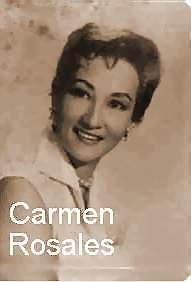|
Carmen Rosales
Januaria Constantino Keller (March 3, 1917 – December 11, 1991), better known by her stage name Carmen Rosales and by her nickname Mameng, was a noted Filipina actress and World War II guerilla fighter.[3] Her acting career spanned the decades immediately before, during, and after World War II. Her tremendous commercial success and wide fan base before the war led to her being considered the original superstar of Philippine movies.[4] Her stage name, Carmen Rosales, was taken from her hometown of Rosales in the province of Pangasinan. Early lifeJanuaria Constantino Keller was born in Rosales, Pangasinan, to Pantaleón Keller Rosales, her father who was half-Swedish and Filipina mother, Pilar Constantino y de la Cruz, who was born April 13, 1872, in Quingua, Bulacan. She was first married to Ramon Navales who was killed in the Second World War, and had a son with him named Rene.[2] After the war ended, she married Jose “Peping” Puyat from the wealthy Puyat Clan with whom she had one child named Cesar Rosales Puyat.[5] Acting careerKeller worked as dressmaker prior to entering acting.[2] She began her career in the radio and was proclaimed "Queen of Radio" in 1936. As Carmen Rosales, she made her film debut was in Mahiwagang Binibini (1938) for Diwata Pictures, based on the zarzuela play of Atang dela Rama titled Ang Kiri. It was followed by Arimunding-Munding (1939) in her first leading role opposite Jose Padilla Jr for Excelsior Films before her contract was rescinded. When her friend brought her to Norberto Quisumbing, she was rejected for not having the bearing of an actress.[6][citation needed] Sampaguita Pictures signed her up in 1939. She was paired with Rogelio dela Rosa in Takip Silim released during the Christmas season of 1939, and of which started their loveteam. They made a total of 12 films under Sampaguita Pictures. After the World War II, she starred in Gerilyera (1946) with Celso Baltazar. Gerilyera was followed by Kaaway ng Bayan (1947) with Leopoldo Salcedo, which made Rosales the most sought-after actress of Philippine Movies. Afterward, she chose to be a freelancer.[7] In 1949, she became the Philippines' highest-paid movie star when LVN Pictures offered her the unprecedented sum of P45,000 to team up again with Rogelio dela Rosa in Kampanang Ginto, followed by Camelia, then Sipag at Yaman with Jose Padilla, Jr. and Batalyon Trece with Jaime dela Rosa. Among her unforgettable roles included the spurned lover of Rogelio dela Rosa in Maalaala Mo Kaya (1954) and a club-singer in Ang Tangi Kong Pag-ibig (1955). She received her first FAMAS Award in 1954 for her role in Inspirasyon opposite Van de Leon. She was similarly awarded in 1960 for playing a strict matron in Estela Mondragon. She garnered fame playing a hacendera in Pablo Gomez's version of MN (1954). Her last public appearance was in 1987 in Inday Badiday's Eye to Eye television program, after which she retired from acting and public life.[8] World War II guerrilla activitiesHer husband Ramon was killed by Japanese forces early in the Japanese Occupation of the Philippines during World War II. As a result, she decided to join a guerrilla group and fight the Japanese. She joined the Hukbong Bayan Laban sa Hapon and became a sharpshooter. She was known for wearing a false mustache during guerrilla raids, in an effort to disguise herself.[7] However, the Japanese were able to persuade her to star in the 1944 film Tatlong Maria after they threatened to massacre a village in Pangasinan if she refused.[9] DeathShe died on December 11, 1991, of kidney failure[citation needed] in Mandaluyong.[2] She is interred at the Loyola Memorial Park in Marikina. LegacyA barrio in Rosales, Pangasinan was named after her. It is now currently divided into two barangays, Carmen East and Carmen West.[2] Filmography
References
External links |
||||||||||||
